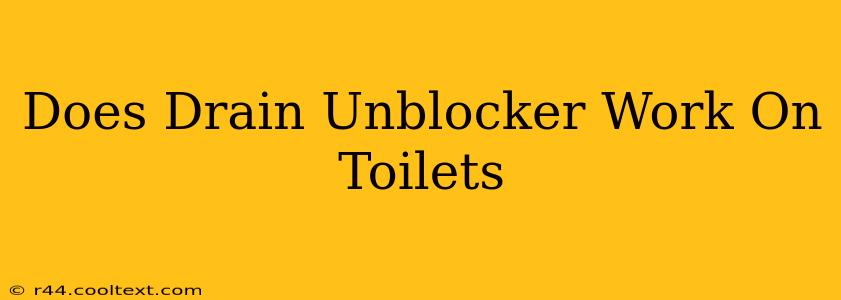Does Drain Unblocker Work On Toilets? A Comprehensive Guide
Many homeowners face the frustrating issue of a clogged toilet. While a plunger is often the first line of defense, many are turning to drain unblocker chemicals for a faster solution. But does drain unblocker work on toilets? The answer isn't a simple yes or no. It depends on several factors, and using these products incorrectly can even worsen the problem.
This guide will explore the effectiveness of drain unblockers on toilets, the potential risks, and safer alternatives.
Understanding Drain Unblockers
Drain unblockers, also known as chemical drain cleaners, are powerful chemical solutions designed to dissolve organic matter causing blockages in drains. They typically contain corrosive chemicals like sulfuric acid or sodium hydroxide. While effective at breaking down hair, grease, and soap scum in pipes, their suitability for toilets requires careful consideration.
Why Drain Unblockers Might Not Work on Toilets
- Type of Clog: Drain unblockers are most effective against organic clogs. However, toilets can become clogged by things drain unblockers struggle with, such as:
- Large solid objects: Toys, sanitary products, or even excessive toilet paper can create blockages that chemical drain cleaners can't dissolve.
- Severe blockages: Extremely severe blockages might require professional plumbing intervention, as the chemicals might not reach the obstruction.
- Toilet Design: The design of a toilet bowl and its plumbing system differs significantly from standard sink or shower drains. The chemicals might not reach the clog effectively due to the toilet's unique shape and the location of the blockage.
- Chemical Damage: The strong chemicals in drain unblockers can damage the porcelain of your toilet bowl over time, especially with repeated use. This damage can lead to costly repairs or even replacement.
When Drain Unblockers Might Work on Toilets
There are specific situations where a drain unblocker might offer a solution, but proceed with extreme caution and follow the manufacturer's instructions meticulously:
- Minor clogs from organic waste: If you suspect a minor clog caused by an excess of toilet paper or a small amount of organic waste, a drain unblocker might work. However, a plunger is often a better, safer, and more effective first step.
- As a last resort: After trying other methods (like a plunger), and if you're confident the clog is relatively small and organic, you might consider a drain unblocker as a final attempt before calling a plumber.
Safer and More Effective Alternatives
Before reaching for a chemical drain unblocker, consider these safer and often more effective alternatives:
- Plunger: A good plunger is the first and often most effective tool for unclogging a toilet. Ensure you create a good seal around the drain opening.
- Hot Water: Pouring several gallons of hot (but not boiling) water into the toilet bowl can sometimes dislodge a minor clog.
- Baking Soda and Vinegar: This natural solution can help break down minor organic clogs. Pour one cup of baking soda followed by one cup of vinegar. Let it fizz for about 30 minutes before flushing.
- Plumbing Snake (Auger): For more stubborn clogs, a plumbing snake can physically dislodge the blockage. This is a relatively inexpensive tool available at most hardware stores.
- Professional Plumber: For severe or recurring clogs, it's best to call a professional plumber. They have the expertise and tools to handle even the most challenging blockages safely and effectively.
Conclusion: Proceed with Caution
While drain unblockers might seem like a quick fix for a clogged toilet, they are not always the best or safest solution. The potential for damage to your toilet and the environment outweighs the convenience in most cases. Always prioritize safer alternatives before resorting to chemical drain cleaners. Remember, prevention is key; avoid flushing inappropriate items down the toilet to prevent future clogs.

